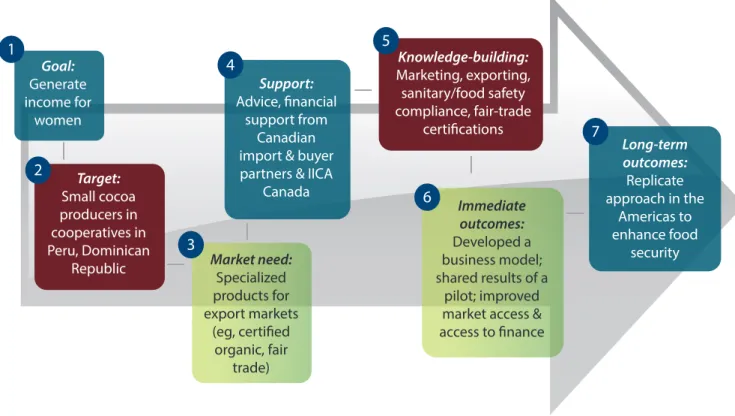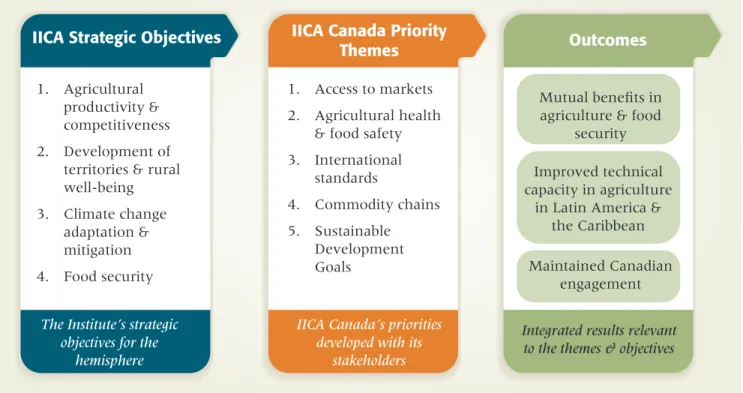4
IICA Delegation in Canada:
Delivering Results
for the Americas
2
0 1 7
• Improving farm worker well-being:
Understanding how to improve the welfare of workers participating in the Seasonal Agricultural Worker Program is important to both Canada and to Latin America and the Caribbean. With the benefit of a study undertaken in the year, the socio-economic conditions of workers and their families were explored and insights were gleaned to help identify knowledge transfer opportunities.
• Empowering youth in agriculture:
Attracting motivated young adults to agriculture and presenting them with diverse career opportunities in this vibrant
sector is an investment in their future and for society as a whole. The Delegation’s Research & Internship Assistance Program (RIAP) facilitated international scientific research exchanges for young adults in Canada as well as in Latin America and the Caribbean.
The UN Sustainable Development Goals stress the importance of partnerships, among other priorities shared by IICA. By aspiring to be a partner of choice for Canadian organizations working in the hemisphere, IICA Canada looks forward to building new strategic partnerships and embarking upon new initiatives to help achieve even more for people and communities in the year ahead.
Inter-American Institute for Cooperation on Agriculture
IICA Canada
130 Albert Street, Suite 1002, Ottawa, Ontario, Canada, K1P 5G4 Phone: 1 (613) 230-1044 / Fax: 1 (613) 230-1951 www.iica.int/canada Goal: Generate income for women Target: Small cocoa producers in cooperatives in Peru, Dominican
Republic Market need:Specialized products for export markets (eg, certified organic, fair trade) Support: Advice, financial support from Canadian import & buyer partners & IICA
Canada Immediate outcomes: Developed a business model; shared results of a pilot; improved market access & access to finance Long-term outcomes: Replicate approach in the Americas to enhance food security 1 2 3 4 5 6 7 Knowledge-building: Marketing, exporting, sanitary/food safety compliance, fair-trade certifications
Diagram 2:
A portrayal of how IICA Canada is enabling opportunities for small-scale women cacao producers3
2
T
he Inter-American Institute forCooperation on Agriculture (IICA) is the preeminent organization to advance agricultural development and rural well-being among 34 countries in the Americas. With the Canadian government’s support and by working with diverse stakeholders, the IICA Delegation in Canada delivered on key agriculture and food priorities in 2017 as part of its Country Strategy and the Institute’s Medium Term Plan (2014 – 2018). The North and South American agri-food sector has directly benefitted from this unique collaboration between Canada and IICA.
Our Value Proposition:
The IICA Delegation in Canada and its partners have recognized that greater integration of the agri-food economies of the Americas is mutually beneficial. As collaborations among Canadian and Latin American and Caribbean agri-food players have increased, the IICA Delegation in Canada has become an effective broker between Canada and member countries, to find new ways to work together. In doing so, IICA Canada has become a conduit to promote shared values across the hemisphere. Its projects and activities have improved livelihoods and prospects of people across Latin America and the Caribbean as highlighted further below. A variety of initiatives were advanced in 2017, from promoting inclusiveness in local food production, such as for women and indigenous
peoples in rural communities, to enhancing the quality of exports of horticultural products to Canada. The IICA Delegation in Canada also enabled valuable Canadian technologies to be deployed to address environmental threats from invasive species and to promote genomic tools to improve animal health. In total, some 40 activities were delivered upon last year to support North American interests as well as those of Latin American and Caribbean researchers, agri-food entrepreneurs, small-scale producers and communities.
The following chart (Diagram 1) provides a high-level view of IICA Canada’s work. The three major outcomes align with IICA’s strategic objectives for the hemisphere and to IICA Canada’s own priority themes, the latter of which were informed by consultations with a broad array of stakeholders.
As a leading partner in development in the hemisphere, the IICA Delegation in Canada expresses its deep appreciation to the Government of Canada for its support. Collaboration is vital to scale up change and IICA Canada will continue to seek extensive input on its work from its stakeholders during the development of the next Medium Term Plan in the upcoming year. Federal and provincial government departments, industry, embassies, universities, innovation and non-government organizations will be engaged, as well as a diverse array of agri-food experts in Canada and from across Latin America and the Caribbean.
Diagram 1:
Overview of IICA Delegation in Canada’s commitment & resultsProject highlights from 2017:
The following selected projects provide examples of how IICA Canada is delivering positive outcomes. Its projects are conferring mutual agriculture and food security benefits to IICA countries and to Canada, improving technical capacity in Latin America and the Caribbean and deepening engagement with Canadian agri-food stakeholders.
• Enhancing agricultural productivity:
Scientific collaboration is vital to improve resource management, respond to agricultural threats (such as pests and disease) and take advantage of new productivity tools and technologies. With IICA Canada’s involvement as the
Secretariat, a dynamic research network of North American agricultural scientists known as PROCINORTE, helped to build local agricultural resilience and fulfill economic and trade opportunities.
•
Benefiting women:
A business model was developed to help rural women to access niche market opportunities for value-added cacao products. The women in the case project in Peru and the Dominican Republic embraced the opportunity to tap into their entrepreneurial spirit and improve their household incomes. The results of this project have broad application across Latin America and the Caribbean. (See Diagram 2 for an overview of this work.)IICA Delegation in Canada:
Delivering Results for the Americas
2
0 1 7
IICA Strategic Objectives IICA Canada PriorityThemes Outcomes
1. Agricultural productivity & competitiveness 2. Development of territories & rural well-being 3. Climate change adaptation & mitigation 4. Food security 1. Access to markets 2. Agricultural health
& food safety 3. International standards 4. Commodity chains 5. Sustainable Development Goals
The Institute’s strategic objectives for the
hemisphere
IICA Canada’s priorities developed with its
stakeholders
Integrated results relevant to the themes & objectives
Mutual benefits in agriculture & food
security
Maintained Canadian engagement Improved technical capacity in agriculture
in Latin America & the Caribbean

